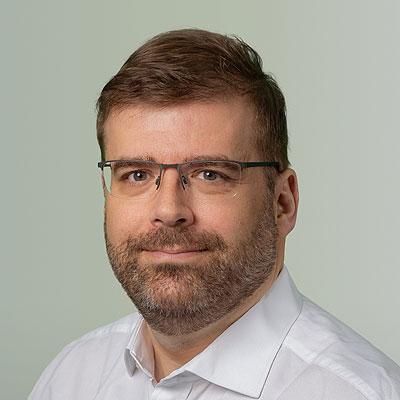By means of interviews with general practitioners, cardiologists and medical assistants, we want to ensure the exchange of experiences among our customers in order to jointly optimize the patient experience and increase the diagnostic yield.
We will start with Michel Wenger, Medical Director of Centramed, based in Basel. Centramed operates ten medical centers in the German speaking part of Switzerland with a focus on family medicine and primary care specialists.

Michel Wenger,
Chief Medical Officer
«CardioFlex empfehle ich meinen Kolleginnen und Kollegen, da klein, komfortabel, wasserfest und mit einer Fernüberwachung ausgestattet.»

CardioFlex has been in use at our medical center since autumn 2022. We started with one sensor and recently ordered a second one due to increased demand. Around 10 doctors work with CardioFlex in our medical center.
Clearly, the simplicity of CardioFlex for the patients convinced us. The fact that patients can take a shower with it means that we can ask them to wear the sensor for longer. I find the remote monitoring of CardioFlex a great advantage. It allows us to intervene at an early stage if the data quality is not good enough.
How do you specifically use CardioFlex with your patients?
CardioFlex is mainly used for these three cardiac arrhythmias:
• palpitations
• syncope
• stroke
Depending on the indication and symptoms, the measurement duration varies. Thanks to CardioFlex, we can measure longer than before. This provides a better base for the diagnosis or exclusion of cardiac arrhythmias.
Our patients wear the sensor with three electrodes. The data quality is very good.
A big advantage of CardioFlex is that the device is on site. We can place the sensor right when it is needed. The follow-up appointment is planned as soon as the diagnostic report is available.
The diagnostic reports are accurate and helpful. They support the planning of the next steps. In the case of palpitations, it can happen that the findings are more descriptive without interpretation or instructions for action.
CardioFlex makes wearing an ECG comfortable and allows patients to shower. Although CardioFlex is fundamentally very simple, it remains a digital tool. It needs to be recharged after a period of time. The smartphone is used to register the diary. With elderly patients this can lead to challenges from time to time.
I recommend CardioFlex to my colleagues because the sensor is small, convenient, waterproof, and the service offers remote monitoring. A collaboration with local cardiologists for reporting is offered. For certain colleagues this can be very useful. At the Centramed medical center in Liestal, for example, we have the diagnostic reports done by our in-house cardiologist.
No, not more than before. But awareness has changed. Patients are much more informed, which helps enormously in the discussion surrounding diagnosis and therapy. Conversations can be conducted at a higher level.
Zurich, March 7, 2023